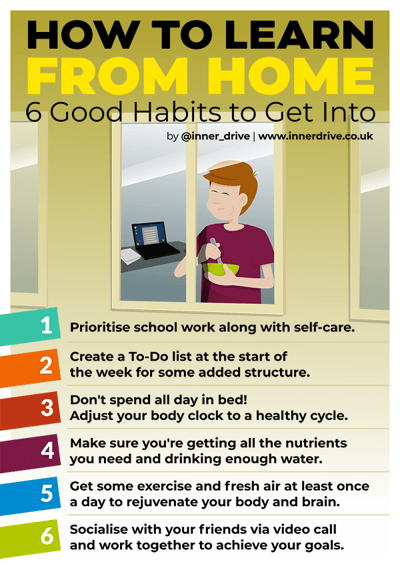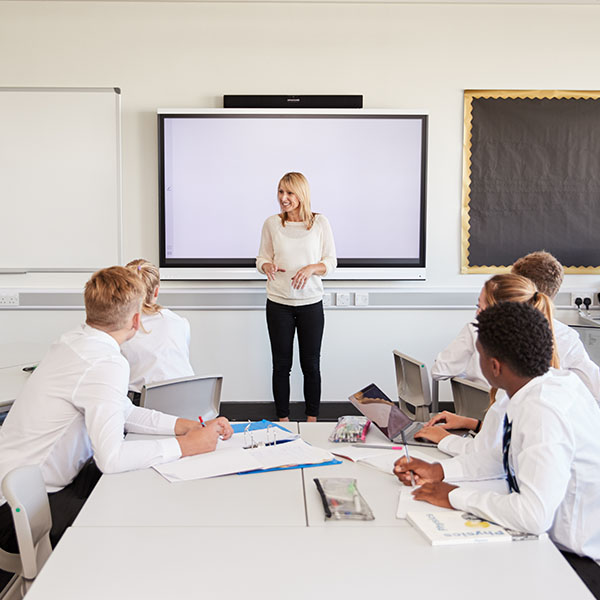Being off school for a few months might sound like a dream come true at first, but a week in, and many students may be wishing they were back at school and out of the house. This is a challenging situation and most students don’t know how to make the most of their time in lockdown to stay on top of their school work.
Whether you’re in Year 6 or Year 11, your education is important and these unprecedented circumstances just require some adapting to different ways of learning.
5 Ways to Work from Home
Maintaining a routine is important during this time. It is very easy to fall into a habit of sleeping all day and spending your nights in front of a TV - at the expense of your learning and well-being. To help students maintain a good routine and motivation during lockdown, we have made free printable goal-setting worksheets - download them here.
There are no rules for how to spend the 24 hours you have in a day, but an effective routine can help you spend your time well, stop you from falling behind, and reduce your boredom.
Here are five ways you can maintain a routine and use this time effectively:
- Decide on your priorities – All students will have received advice from their teachers on how to proceed with their work during this time. Outline the tasks you need to complete at the start of the week and work through them at a comfortable pace. Finish your tasks for the day and then take some time to focus on self-care by doing something you enjoy.
- Get enough sleep, but not too much! – With all this newfound free time, it’s tempting to put off other things and stay in bed a little longer. Try to get the recommended 8-10 hours of sleep and stick to your usual routine: go to bed and wake up early as you would on a normal school day. It will make it easier for you to adjust when you get back to school and it could even help you readjust your body clock if you have had bad sleep habits.
- Stay hydrated and nourished – You have access to your kitchen all day, so no excuse not to drink enough water and eat enough healthy food. Be sure to get the nutrition you need and indulge in something sweet when you need it. However, make sure you’re getting a balance of everything necessary and don’t forget to drink lots of water! It is something so important that many of us forget to do. Set a target to drink a litre and a half of water a day; the recommended amount of water for children aged 9+.
- Stay active – Set aside an hour a day to do some exercise or any physical activity you find enjoyable. Whilst we’re avoiding gyms and anywhere busy, taking a walk around your neighbourhood or riding your bike to the supermarket is an easy alternative that gives you an opportunity for fresh air and a little exercise. There are also tons of exercises you can do from home - we’re loving Joe Wicks’ live PE lessons on YouTube.
- Being social whilst social distancing – Physically meeting with friends is no longer an option, but that doesn’t mean that you can’t socialise. Video call your friends or play a game together online during your free time. Why not set some easy but productive goals together and discuss your progress? This will keep you motivated and give you an opportunity to socialise with your friends, whilst staying safe.
Feeling Worried?
Uncertainty is rife at this time. From students like you, to your parents and your teachers, everyone is experiencing things they have never experienced before. Whilst it may be difficult, it is important to remind ourselves that this time will pass and that you can help resolve it by staying home. Uncertainty breeds stress and can often lead to a whole range of other negative effects. Now, there is nothing we can say that will for sure will get rid of your worries, but a great place to start is by spending time doing things that help you feel relaxed. Be proactive and get ahead of the situation by keeping yourself occupied and follow these tips to reduce stress.
Final Thoughts
Remote learning is how most students are going to be spending the last few months of this academic year. It is a huge change from what you may be used to, however there are many ways you can make the most of this time and still continue to improve academically if you make the effort.







